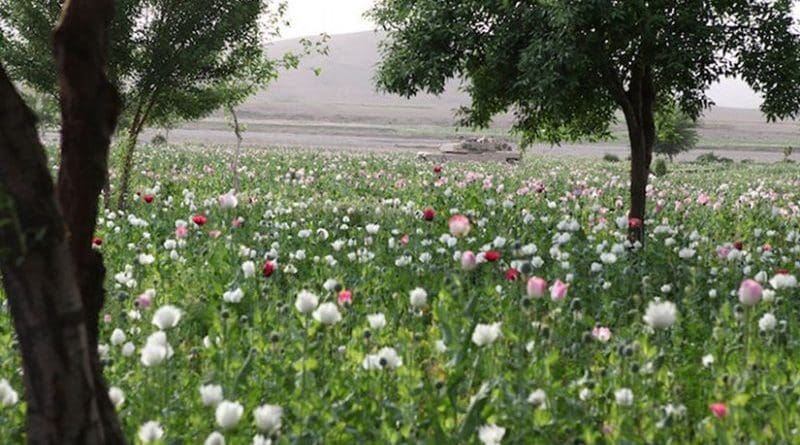Drug Trafficking In Afghanistan: Implications For Regional Security – Analysys
Afghanistan has become the major country that produces opium, heroin and hashish. Estimates between 1,500 and 3,500 tones a year. Situation is getting worse day by day. According to the latest Afghanistan Opium Survey report 2011, the winter assessment in the Helmand and Kandahar predicts an overall trivial decrease in opium cultivation for 2011. Afghanistan has long been the world’s leading supplier of opium, but in recent years managed to produce thousands of tones more than the entire global demand for the drug.
According to the UN estimates the provinces where poppy cultivation is getting momentum is eastern Kapisa, Ghor in the west and northern Baghlan and Faryab. Badakhshan, which borders Tajikistan, and Herat which borders Iran, both major trafficking routes, are also expected to see a strong increase in cultivation. Some 90 percent of villages in the south are also involved in poppy cultivation. It is alleged by the US that Taliban-led militants are believed to derive $100-$400 million a year in revenues from production and trafficking of the drug, fuelling insecurity making things worse for the US led alliance and Afghan government but major share of the Afghan drug trade is under the control of elements friendly to the Afghan government and/or the foreign occupying forces. In reality Taliban take only 2 to 12 percent of a $4 billion industry. According to different surveys the high sales price of opium is a driving force behind, farmer’s decision to sow an opium crop. Between Feb 2010 and Feb 2011, dry opium prices tripled and fresh opium prices more than doubled.
According to different estimates at present, 90 per cent of the world’s opium is produced in Afghanistan and out of that, 44 per cent is trafficked through Pakistan. Afghan opium and drug trafficking is a potential threat to Pakistan’s national security interests. These drug traffickers are equipped with latest weapon and equipment. Hundreds of Pakistan security personnel lost their lives in their endeavor to control drug trafficking from Afghanistan and Pakistan.
Russia has also suffered a lot from the drug trafficking in Afghanistan. According to Russian officials 30 tons of drugs, mostly from Afghanistan in the form of heroin, are trafficked into Russia annually. Russia confiscates about 10% of that amount and almost all of the remainder is consumed in Russia, which has resulted in deaths of approximately 30,000 Russians every year.
Russia is now actively taking practical steps to stem out opium laboratories and drug mafia in Afghanistan. Recently Russia has carried out joint operations with American drug control agencies in Afghanistan, although it was condemned by the Afghan President Hamid Karzai but at the same time it was considered to be a major success against the drug traffickers. Such operations should be coordinated with the Afghan government only then we can get fruitful results against drug trafficking in Afghanistan. It is necessary to control the production of opium in Afghanistan. US led alliance and Afghan Government has been failed to overcome this issue. There are allegations that Hamid Karzai’s brother and some of the member of his government are also involved in this filthy business.
In addition to that United States can eradicate opium crops by aerial spray, but it is reluctant to do so because of the resentment from Karzai government. Karzai government do not want to lose the support of warlords involved in the drug trafficking, that is the reason of reluctance from Karzai regime.
It is imperative for the neighboring countries of Afghanistan that they should work together to check the routes used for the shipping of opium from Afghanistan, only then this issue can be resolved. Pakistan has played a significant role to curb drug trafficking, in last three years Pakistan has seized drugs worth $130 million. According to interior minister Rehman Malik “last year on International Drugs Abuse Day, Pakistan destroyed almost 95,000 kilogrammes of drugs, Pakistan has succeeded to make huge seizures in the world but despite that mutual cooperation is required to overcome increasing drug trafficking in the region.
To conclude, regional cooperation is necessary, Pakistan, Iran, Russia, Central Asian states along with United States and NATO must work together to curb the drug trafficking network in Afghanistan. Coast Guards in Pakistan should be given all powers of Customs and Immigration to boost their powers to check any illegal activity in their jurisdiction, because narcotics worth dollars 5 billion was being traded from Afghanistan via porous border routes of Balochistan. More anti- narcotics battalions of coast guards should be raised, strengthened and also equipped with helicopters, speed boats and planes to further improve their surveillance. It is difficult to fence the whole border with Afghanistan because of the geographical compulsions. But selective fencing at certain points of borders with Afghanistan will help to reduce the flow of drugs from Afghanistan. All SCO member states must make efforts to promote security and stability in Afghanistan. Sincere efforts are required to get rid of the drug mafia in Afghanistan, Pakistan, Central Asia and Iran. There is a need to allocate huge sums of financial resources to eradicate poppy cultivation from Afghanistan and provide farmers with alternate livelihood, only then we can attain the goal of peaceful and prosper Afghanistan, which is necessary for the regional and global peace.
Originally published weekly pulse magazine. http://www.weeklypulse.org/details.aspx?contentID=530&storylist=10

